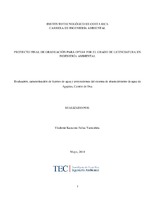Evaluación, caracterización de fuentes de agua y proyecciones del sistema de abastecimiento de agua de Agujitas, Cantón de Osa.
Resumen
In Costa Rica, despite the fact that nearly a quarter of the population is served by municipal or rural water systems, many of these systems operate in fragile condition. An example is the town of Agujitas in Canton de Osa, where it was decided to generate base information towards the improvement of water supply for human consumption. The conditions of system operation and water quality at the sources were analyzed and assessed. Projections of water needs were also made to set availability scenarios using a methodology based on disaggregated consumption, used in Colombia and another based on the calculation of equivalent houses, recommended by the Costa Rican Institute of Aqueducts and Sewerage (AyA). Additionally, a survey was conducted to the users of the aqueduct and distributed water was analyzed in order to identify the major problems of service and water quality in the system. Numerous conditions of vulnerability that compromise the service itself and population’s health, such as poor infrastructure, discontinuous service and fecal contamination in all sampled points in the distribution network were identified. Water sources (surface type), showed low quality ranges in fecal coliform and turbidity according to a model for the selection of multi-stage filtration (MSF) systems, developed in Colombia, with averages less than 500 MPN/100 mL and 10 NTU respectively, indicating that the purification could be feasible by this type of system. Water availability scenarios showed similar results with both methods and suggest that it could be a shortage of water if measures are not implemented to reduce the irrational consumption; also they suggest the need for further studies such as volumetric audits.
Descripción
Proyecto de Graduación (Licenciatura en Ingeniería Ambiental). Instituto Tecnológico de Costa Rica. Escuela de Química, 2014.


